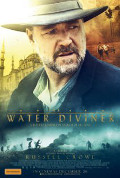
Directed by
Russell Crowe
111 minutes
Rated M
Reviewed by
Bernard Hemingway

The Water Diviner
Synopsis: Joshua Connor (Russell Crowe) is a small farmer in Outback Australia who has lost his 3 sons at Gallipoli four years previously. When his inconsolable wife drowns herself he travels to Turkey to try to locate his sons’ bodies and bury them next to his wife.
Russell Crowe, with some justification, is not known for his modesty. Consequently his first feature as a director has quite a lot riding on it. Sadly, whilst being a solid and at times, impressive production, The Water Diviner is far from being a glorious debut. Which is somewhat surprising fora man who has worked with, and presumably watched the films of, Peter Weir, Michael Mann, Ridley Scott, Darren Aronofsky and other film-makers of a similar calibre.
The impressive aspects of his film are largely technical. Andrew Lesnie’s cinematography is superb, investing the film in its opening stages with an almost hyper-realistic clarity that bespeaks lofty ambitions And working with a first class production and costume design and art direction team, as a period piece The Water Diviner is never less than excellent. Also impressive is the way that scriptwriters Andrew Knight and Andrew Anastasios tackle the conflicting perspectives of the Gallipoli campaign: for the Australians, a massacre of the innocents, for the Turks, an invasion of their homeland. Giving that conflict immediacy and positioning the film as a worthy successor to Peter Weir's classic 1981 take on the legendary battle is the story of a father's search for the remains of his three dead sons, a potentially poignant indictment of the terrible Imperial folly that was WWI. Also recalling Weir is the use throughout the film of a water motif with its manifold symbolic connotations, a nice touch that does much to give the various parts of the story a sense of thematic coherence.
Crowe's helming of this ambitiously sweeping material is, for a tyro director also impressive albeit lacking somewhat in clarity of vision. It opens with a title telling us that it was “inspired by real events” but whereas it starts out with a realistic approach, establishing the two arcs of the story by showing us the carnage of Gallipoli on the one hand and the travails of Connor’s harsh life on the land on the other, as the film progresses it becomes increasingly shaped by Hollywood conventions. Connor effectively morphs into an Indiana Jones style adventure hero endowed with near-supernatural gifts of intuition (and a white horse!) while the film dallies with a generic romantic sub-plot in the form of a beautiful Turkish widow (Olga Kurylenko) with a precocious son who inexplicably speaks good English and, of course, adores the fatherly Joshua. To his credit Crowe does not overdo the potential for sentimentality but his pitch is always towards the crowd-pleasing.
Dramatically problematic too is the fact that Joshua's three sons are no more than ciphers, briefly seen as children then as young men about to die on the field of battle. Had more time been spent on giving them faces and personalities, Joshua's quest might have been a good deal more emotionally meaningful. As is it, the film gives us the broad strokes and the familiar cues of a redemptive narrative and presumes that, having seen this sort of thing many times before, we will oblige with the feeling.
In the lead Crowe wisely subdues his performance but in so doing falls back on formulaic constraints to which he is ill-suited. As we well know, he is very good at making strong emotions palpable but here, as a nobly grieving father and widow he is merely playing a part. And even if the production is top-drawer, there is simply too much of it, particularly the Gallipoli flashbacks which Crowe is over-keen to replay. Not only is their repetition gratuitous but they linger on the physical brutality of war, making one wonder why a film with such lugubrious subject-matter at its core is being released at the peak of the summer holiday season.
Crowe has a formidable reputation as an adopted son (so much so that local media moguls James Packer and Kerry Stokes added their names to the credits) and this should give his film some legs. Although at times one feels shades of The Man From Snowy River pulling at Crowe's directorial style his film is too generically Hollywoodized to attract an audience for its mythically Australian character (a very implausible scene with a cricket bat does nothing to help in this respect). On the other hand it is too grounded in a cruel reality to appeal to anyone looking for a big screen adventure romance. We can only wish that Crowe had opted for one kind of film or the other.
As it is, The Water Diviner is a serviceable big budget period drama, impressive in some respects but suffering from trying to be all things to all audiences.

Want more about this film?


Want something different?




